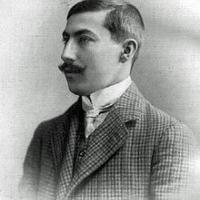
Akiba Rubinstein vs. Alexander Alekhine
Akiba Rubinstein (1882-1961) was a Polish Jew born when Russia ruled most of Poland. He learned chess at the age of 16, which is now considered too late. Within five years, he gave up his studies to become a rabbi to play chess. It took him another four years to be considered one of the world’s best players. In 1912, he won five major events in a row. A match with the world champion, Emanuel Lasker, was set to take place in October 1914, but war began July 28, 1914. The guns of August blew into the Great War or World War I. This ended Rubinstein’s chance to play for the title.
In later years, Paul Keres was regarded as the best player to not have become world champion. In more recent times, it has been argued that Viktor Korchnoi deserves that regard. Earlier, it was Rubinstein that was held to be the best non-champion. While Keres, never had a match for the title, he did play in the tournament for the world championship in 1948. Korchnoi played in two championship matches with Karpov (1978 and 1981). Rubinstein as a competitor to be called the best player to never become world champion has less competition to be called the best to never have played for the world championship.
Alexander Alekhine (1892-1946) became world champion in 1927. Just as people argue about which player is the best non-champion, they argue about which champion was the best. Alekhine is at least considered a good champion. My databases show the results of Rubinstein versus Alekhine. From 1911 to 1914, Rubinstein won 2, lost 1, and drew 1. From 1921-1930, Rubinstein won 1, lost 7, and drew 2. In the earlier period, Alekhine was not as strong as Rubinstein. However, Alekhine was ten years younger. In the latter period, Alekhine was clearly stronger than Rubinstein. However, Rubinstein was ten years older. At first being younger is a disadvantage. Later being younger is an advantage. Rubinstein had declined while Alekhine had improved.
I have selected a game from the Russian National Tournament or Championship of 1912, which was held in Vilna (Vilnius), to show Rubinstein against Alekhine. This event had ten players (after one dropped out) and was a double round robin. Rubinstein won the tournament with 12/18. he had 9 wins, 3 losses, and 6 draws. Alekhine placed sixth with a score of 8.5/18. He had 7 wins, 8 losses, and 3 draws. Rubinstein won both his games with Alekhine, but one of those games is not in the databases. Some of Rubinstein’s other games from this period are not available. This means that his score with Alekhine from 1911 to 1914 was one (or probably more) better than above.

